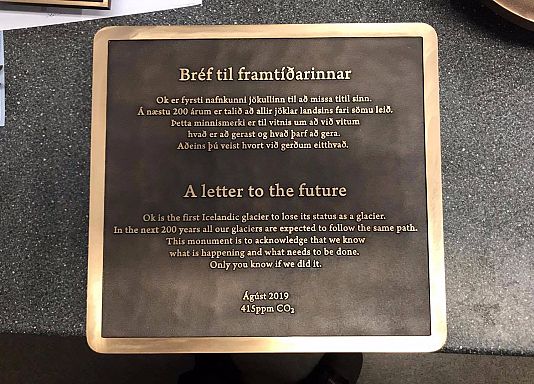Okjökull was the first Icelandic glacier to lose its status due to climate change.
Okjökull was the first Icelandic glacier to disappear due to climate change, and now it will be the first to have a monument to "mark its passing."
The iconic glacier melted during the 20th century and was officially declared "dead" in 2014.
Now researchers from Rice University along with author Andri Snær Magnason, geologist Oddur Sigurðsson and members of the Icelandic Hiking Society plan to install a monument to remember the lost glacier.
"In the next 200 years all our glaciers are expected to follow the same path," warns the plaque, which will be installed at the site of the "glacier-no-more" on August 18.
The words, written by Icelandic author Andri Snær Magnason, are supposed to be "a letter to the future".
"This monument is to acknowledge that we know what is happening and what needs to be done. Only you know if we did it," the memorial's message continues.
According to an article written by NASA's Kathryn Hansen, a geological map from 1901 showed the glacier spanned an area of roughly 38 square kilometres, but today less than one square kilometre remains of it.
"We are talking about the ethical consequences in the future of what we do today," explained the memorial's architects Cymene Howe and Dominic Boyer in an interview with Euronews.
"We are living with the decisions of our parents and passing a future planet to our children and grandchildren, who will have to live with our decisions."
The Rice University anthropologists wanted to create a lasting memorial to the glacier.
In 2018, they released a documentary about the glacier entitled "Not ok", as "Ok" is the name the glacier goes by in Iceland.
"Normally we talk about the scientific part, statistics, heat waves, droughts, fires ... but we wanted to do something different," Howe explained.
They said scientists fear that all of Iceland's over 400 glaciers will disappear by 2200.
The disappearing glaciers are expected to change life in Iceland.
The country's hydroelectric power plants use water produced by the seasonal melting of glaciers. Fishing and tourism industries could also be adversely impacted by the melting of glaciers.
"With this memorial, we want to underscore that it is up to us, the living, to collectively respond to the rapid loss of glaciers and the ongoing impacts of climate change," Howe said.












